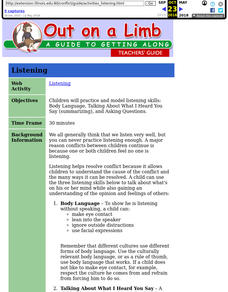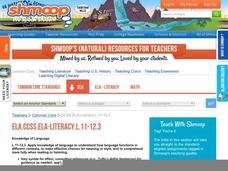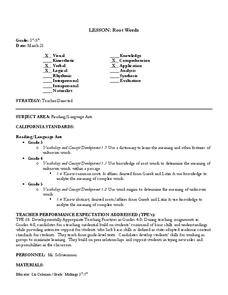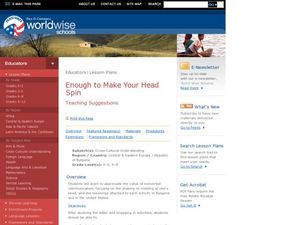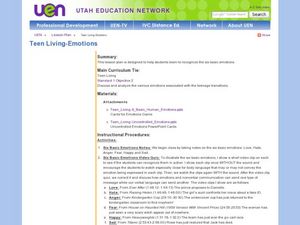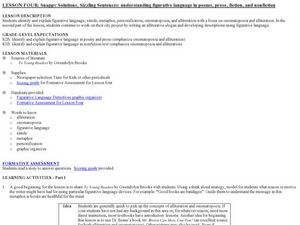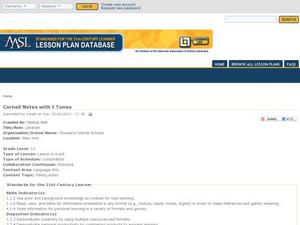Curated OER
"The Cask of Amontillado" Study Guide
In this study guide worksheet, middle schoolers complete 10 vocabulary definitions, 8 literary terms definitions and 11 short answer questions about the story.
Curated OER
A Guide to Getting Along: Listening
Here is an effective way to have your charges practice and model important listening skills. After a short review of effective active listening concepts, such as using body language, summarizing what the other person said, and asking...
Shmoop
ELA.CCSS.ELA-Literacy.L.11-12.3
Tired of simple sentences? Bored by brief sentences? Plagued by boring sentences? Enrich your life and the writing of your pupils by modeling how to combine sentences to create more varied syntax. Groups then find a number of ways to...
Curated OER
Remembering Waiting
After a close study of the pastel drawing Waiting by Edgar Degas have the class imagine the story Degas may be telling through the body language and clothing of the people in the work of art. Your young writers then create a drawing...
Curated OER
Image as Metaphor
A Dorothea Lange photograph launches this study of metaphors. Using the questions provided, the class examines the image and the title to consider how Lange uses her photo as a metaphor. Class members then select an object they can use...
Curated OER
Narrative Nuts and Bolts
After viewing slides and reading about child labor, young authors compose an original narrative story. They practice note-taking skills and work to effectively engage a reader by incorporating plot, logical order, complex characters,...
Haut Gap Middle School
Root Words
Scholars demonstrate their knowledge of root words aqua and aud, and develop vocabulary skills by completing of a chart, handout, and worksheet using creative thinking skills, a dictionary, and a thesaurus.
Curated OER
Choosing Words Carefully
Use literacy tools to select precise vocabulary. High schoolers respond to discussion questions that require them to consider the denotation and connotation of words. They then read non-fiction passages and identify words in the passages...
Curated OER
Making Inferences While Identifying Similes and Metaphors
Use this lesson to study similes and metaphors and the inferred meaning. In this language arts lesson, 5th graders write their own similes and metaphors. A worksheet is provided for extension work or to check understanding as homework.
Curated OER
Exploring the Hudson in 1609
While this lesson focuses on a study of the Hudson River, it could be used as a template for a discussion of map skills, converting measurements, and plotting a route. The lesson includes vocabulary and other resources to make it a...
Curated OER
Writing Prompts for High School
Are you teaching a high school language arts class and stumped for writing topics? Five pages of writing prompts for all kinds of writing should help you out. Many of these prompts refer to texts that are not included in this resource,...
Curated OER
Listening To a Guest Speaker
Pupils review the main points of note-taking to summarize the content of a formal or informal spoken presentation. They hear a guest speaker talk about a pre-arranged topic and take notes during the presentation. Next, they write a...
Curated OER
Sorting
Students examine the concepts of organization and classification. In this library skills lesson, students practice ordering and sorting skills by playing an interactive Internet game. Students then practice their classification skills in...
Curated OER
Enough to Make Your Head Spin
Students investigate the world of nonverbal communication by analyzing body language around the world. In this cultural communication instructional activity, students research the Bulgarian language and how we could easily misinterpret...
Curated OER
Teen Living: Six Basic Emotions
Helping teens recognize and identify the six basic emotions, this activity involves a game in which they match feelings with statements on cards. No game card content is attached. View film clips first with no sound to evaluate body...
Curated OER
Simply Speaking
Emerging orators distinguish between effective and ineffective public speaking strategies. They read a text that fits in with a Native Americans unit and speak about the text with both ineffective and effective volume, tone, phrasing,...
Curated OER
Fairy Dictionary
Use artwork to illicit responses in a writing journal, and then present your class with the short list of key terms provided. Can your learners add any of their own key terms? Segue for a second, and read tales such as Peter Pan or...
Curated OER
Physical Education Word of the Week
Practice physical education vocabulary in your classroom. Working with language arts teachers, learners use dictionary skills to define and explain a word dealing with a concept in physical education. They also complete a task and have...
Curated OER
Beginning Sounds
Kindergarteners recognize words that begin with the same sound. In this word study lesson, they identify initial consonant sounds in words written on the board and write another word with the same beginning sound. Also, there is a...
Curated OER
Time Capsule: Oral Presentation
A great way to gain proficiency when learning a new language is to prepare an oral presentation. In this foreign language lesson, pairs collaborate to develop a Time Capsule which they present to their class using their target language.
Curated OER
Logs, Charts, and Journals: What's On Your Plate?
Have your writers identify and use words that appeal to the senses. They create a chart of sensory words and record some of their favorites, then write a journal entry in which they describe eating at a restaurant using sensory details....
Curated OER
Imagine That! Analyzing Imagery
Poems by O. Henry, Marion Dane Bauer, Monty Roberts, and Langston Hughes provide the text for a study of symbolism, hyperbole, and imagery. Employing the “think-pair-share” strategy learners generate definitions of these terms and locate...
Curated OER
Snappy Solutions, Sizzling Sentences
An examination of the figurative language in Gwendolyn Brooks’ To Young Readers challenges your writers to think about the richness of language. Ask your class why Brooks says, “Good books are bandages.” This discussion of alliteration,...
Curated OER
Cornell Notes with I Tunes
Note taking is an invaluable skill and requires practice. This lesson incorporates the Cornell Notes format, however the plan itself could be implemented to teach any style. The basic idea here is to use university lectures on podcasts...
Other popular searches
- English Language Skills
- Pragmatic Language Skills
- Expressive Language Skills
- Oral Language Skills
- Language Skills Lesson Plans
- English Language Arts Skills
- Early Literacy Oral Language
- Functional Language Skills
- Social Language Skills
- Studying Latin Language
- Basic Language Skills
- Figurative Language Skills



